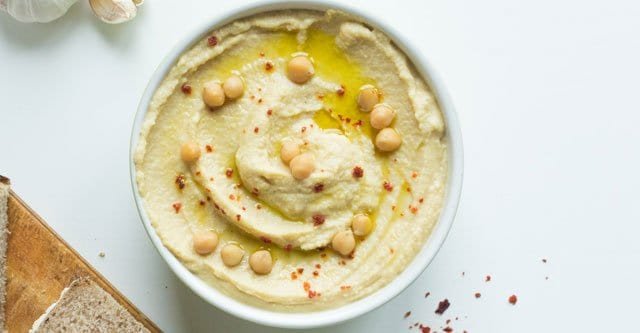Last Updated on June 28, 2021 by Dr Sharon Baisil MD
Here, in this article, we will discuss the Glycemic Index of Hummus and its serving sizes, which are required for a diabetic patient.
The Glycemic Index of Hummus is 10, which is very low. However, this can vary greatly from 6 to 86, based on the type of preparation and combinations that we serve it with.
Read on to understand more about it and the ideal serving size for a person with diabetes.
What is Hummus?

Hummus is a very popular dish that originated in the Middle East. This is a delicious dip or even a spread made with the goodness of chickpeas. As a dip and spread, Hummus has distributed around the globe and is one of the familiar dishes found everywhere.
Hummus is a healthy and tasty recipe made with mashed chickpeas, blended in tahini, with lemon juice, salt, garlic, olive oil, etc. This melts in your mouth, has a vibrant and creamy taste, a smooth texture, and adds a lot of flavor to whatever you pair this dip with.
Hummus is a great side dip and also nourishing. The nutrients from the pulses family are rich in various elements that are helpful for the body. It has a fair amount of fibers, vitamins, minerals, protein, etc.
Hummus is commonly used as a healthy spread for bread, a dip for fresh vegetables like baby carrots and celery, dressing on salads, a creamy sandwich sauce, or even just as a savory side dish with any meal.
It can be made at home with all the easiest at-home ingredients and bought from stores around. It can also be preserved and refrigerated for a reasonable amount of time.
Glycemic Index of Hummus, Falafel, and Tabbouleh

Hummus is a food dip that is rich in a lot of nutrients and is also recommended as a safe and healthy food item for diabetic, pre-diabetic, or trying to watch and lose their weight.
Well, a lot of the qualities of Hummus are suitable for the body and do not have any adverse effects if taken with reasonable care and caution.
Any food for a diabetes patient should be first researched to know how it can affect that individual’s sugar levels.
One of the significant ways of qualifying a food into a healthy diabetic category is to check its Glycemic Index, as it deals with the number of carbohydrates in that food item and how it can raise or drop the levels of glucose in the body.
Well, Hummus is made from chickpea, which comes under the pulses family. Pulses are known to have a lower Glycemic Index and are often associated with the amount of good protein they contain.
They are also an excellent nutritional supplement to control and reduce the risk of diabetes, heart diseases, weight gains, etc.
| Food Name | Glycemic Index | Serve (g) | Carb per Serve (g) | GL |
| Hummus (chickpea salad dip) | 6 | 30 | 5 | 0 |
| Lebanese bread (white, unleaved), Hummus, falafel, and tabbouleh | 86 | 120 | 45 | 39 |
Chickpeas that are the main ingredient in Hummus have a glycemic index of 28. Also, the Glycemic Load (GL) of Hummus is low, and thus, safe for people with diabetes as well.
Depending on how you prepare your Hummus at home or buy it from the store, the GI of Hummus can vary. Due to processing and other added preservatives, etc. hummus that is store-brought usually has a higher GI than homemade Hummus.
Hummus is often paired with other items, such as white bread, crackers, etc. These foods have higher carbs and can increase the total calories taken along with the Hummus.
Thus, while having Hummus, be careful in choosing a good pair, and eat in limited and safe quantities.
This versatile Middle Eastern dip is packed with several nutrients. Hummus has many vitamins and minerals, along with lesser amounts of carbs and other dietetically harmful elements.
Hummus is a good source of fiber, which is essential to maintain good gut health and compromise any harmful effects on blood sugar levels. Fiber also improves dietary health and is beneficial to overall digestive functioning.
Legumes like chickpeas are a good carbohydrate and protein-rich source, and the added tahini, which is a sesame seed paste, is enriched with omega-3, amino acids, and fatty acids.
Hummus is rich in Magnesium, Copper, Folate, Manganese, Phosphorus, Iron, etc. These minerals are essential in a fair and healthy diet to maintain weight without adverse effects on a diabetic’s diet.
Hummus is also nourished with an efficient amount of plant-based proteins. Proteins are essential in providing energy without raising blood sugar levels beyond limits.
All the goodness and enriching qualities of Hummus make it a safe go-to option for people with diabetes. Hummus can be paired with fresh veggies like celery and carrots to make a healthy snack.
What is an ideal serving size for Hummus?

Hummus, although it can be very beneficial to the gut, digestive system, diabetic health, vegan or vegetarian routine, etc. But it is still advised to be had in certain controlled portions.
Portion size is among the main things a diabetic patient should consider, be it any food item. Proper and safe serving size of each food item is necessary to be known to assist your diabetic diet schedule and not give in to any risks from over-eating.
Having more than assigned portions of any food item, as a diabetic patient, can be harmful to the body’s glucose and sugar levels.
When it comes to Hummus, although it is healthy and rich in fibers, proteins, etc. but having more of this creamy dip can be harmful as it can add calories. It is a rather calorie-dense side spread.
According to the American Diabetes Association, a safe and healthy serving size of Hummus for a diabetic person should only be one-third of a cup. This is also approximately equal to a tablespoon.
100 grams of Hummus has 177 calories and around 15 grams of carbs. Therefore, to keep the nutrients balanced on consumption and not have any adverse spikes in the blood sugars, a diabetic person must prefer only one-third cup of Hummus in a day.
Hummus is a protein-rich and healthy dip. It has the quality to be absorbed by the digestive system slower than carbohydrates and tends to make one feel full.
The breakdown of proteins in the body happens at a slower pace than the breaking down of carbs; thus, the level of sugar in the blood does not rise suddenly, preventing any severe causes.
Fresh Hummus prepared at home, or in a restraint, is a lot better and nutritious than the processed and packaged Hummus available in the markets.
Real good Hummus should have around 175 calories in a 100-gram measure. On the other hand, due to the addition of fat in the Hummus sold commercially, the levels of calories go up to around 320 to 350 grams.
While serving yourself a part of this healthy, protein-rich, creamy dip, to pair with your chips, crackers, salads, bread, or veggie slices, make sure to take safe portions of it you do not add up any unwanted calories.
Hummus can be served as a side spread with other snacks meant for a quick bedtime meal, as is recommended for people with diabetes.
It is always vigilant and advisable to test your blood glucose level after a meal, to monitor the changes brought in by the food or meal. It is best to immediately report such results to your doctor or medical health team in case of any unusual observations.
What are the Health Benefits of Hummus

- Hummus has certain nutritional benefits that work in fighting inflammation. Olive oil, which is a significant ingredient when preparing Hummus, has the goodness of antioxidants that help fight against inflammation.
- Sesame seeds also have qualities that help in reducing the anti-inflammatory risks in the body.
- Every 100 gram serving of Hummus provides a 6-gram amount of fiber to the human body. This fiber helps in improving the digestive gut health by feeding the necessary gut bacteria. It also improves stool formation and keeps bowel movements healthy.
- Hummus also assists in regulating heart health in individuals. A considerable amount of the population suffers from chronic heart diseases. This is a risky condition.
- Chickpeas present in Hummus provide heart-healthy fats and good cholesterol. Olive oil in Hummus is also an excellent source to derive heart-healthy fats. Overall, these ingredients make up a healthy food supplement and help reduce heart-related risks and diseases.
- Hummus is also a great addition to food items in a person’s dietary schedule. It has been researched and observed that individuals who include chickpeas and Hummus in their diet have lower risks of gaining weight.
- Their overall BMI was also lesser than those who do not include these in their diets. Hummus is a healthy option if you are looking for something to include in your healthy diet. It helps in maintaining body weight, as it fulfills the appetite and is satisfying. The fiber present in it is also responsible for fueling this benefit.
- Hummus is a dip, which is free of dairy products, nuts, and gluten. Thus, it is also a good alternative for lactose-intolerant, nut allergies, or celiac problems. Thus, almost everyone can access this wholesome, smooth, and tasty spread without an allergic reaction.
Since we have now understood the essentiality of homemade Hummus over market-brought ones, you can head over to your preferred hummus recipe online and prepare a good dip. Be careful to watch your portions along with your blood sugar levels.
References
- https://link.springer.com/article/10.1186/s12937-016-0129-1
- https://www.mdpi.com/2072-6643/8/12/766
- https://academic.oup.com/jn/article/150/8/2214/5850414?login=true
- https://www.mdpi.com/2072-6643/12/12/3678
- https://faseb.onlinelibrary.wiley.com/doi/abs/10.1096/fasebj.28.1_supplement.1039.6
- https://www.tandfonline.com/doi/abs/10.1080/10408398.2020.1762162
- https://pubmed.ncbi.nlm.nih.gov/27916819/









